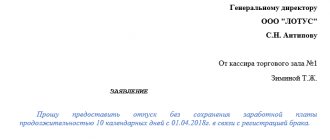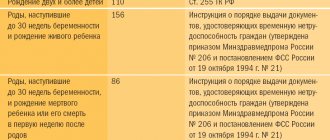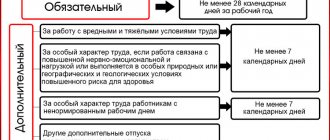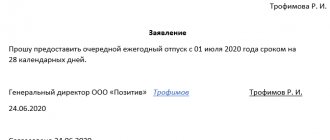Home / Labor Law / Vacation
Back
Published: 06/09/2016
Reading time: 7 min
0
2014
Teaching staff and heads of educational organizations are provided not with the usual basic paid leave of 28 days, but with an extended one.
According to Article 334 of the Labor Code, its duration is determined by the Government of the Russian Federation, which in 2015 signed Resolution No. 466, establishing the number of paid days of rest provided to this category of workers in accordance with the nomenclature of positions held.
Extended vacations, as before, are 42 and 56 days.
- Categories that are eligible for this type of leave
- Terms of service
- Documenting
- Payments
Everyone has the right to vacation
All employees working under employment contracts have the right to annual paid leave. Not only the main employees, but also the following employees have the right to leave:
- part-time workers;
- "conscripts";
- seasonal workers;
- remote workers and homeworkers (part 2 of article 287, 291, 295, part 4 of article 310, part 2 of article 312.4 of the Labor Code of the Russian Federation).
In most cases, employees are entitled to 28 calendar days of vacation, but some employees are entitled to longer vacations under current legislation. Annual paid basic leave lasting more than 28 calendar days is called extended leave (Part 2 of Article 115 of the Labor Code of the Russian Federation).
Categories that are eligible for this type of leave
The right to extended vacations is reserved only for those employees who work in organizations related to the implementation of educational programs on the basis of a license, and whose activities are directly related to teaching. This:
- teachers;
- heads of educational institutions and their structural divisions;
- deputy managers.
The leave is called extended because, compared to other categories of citizens, it is provided in double form - 56 days and 42 days.
This is due to the fact that teachers experience increased psychological and emotional stress throughout the year.
Employees of organizations (offices) can count on 42 days of paid rest:
- preschool education;
- additional education;
- engaged in educational and methodological work.
56 days are provided to employees:
- primary, secondary and higher education;
- organizations based on schools, factories and workshops;
- conducting advanced training courses;
- departments providing psychological assistance working at educational institutions;
- medical institutions conducting teaching activities.
Right to extended leave
Now let's figure out who is entitled to extended annual basic paid leave. The right to such leave is established by the Labor Code, Federal laws and other regulations. For example, extended main leave is due:
- for minor workers – 31 calendar days (Article 267 of the Labor Code of the Russian Federation);
- for disabled people - 30 calendar days (Article 23 of the Federal Law of November 24, 1995 No. 181-FZ);
- for pensioners living in nursing homes - 30 calendar days (Article 5, 13 of the Federal Law of 02.08.1995 No. 122-FZ);
- teachers listed in the annex to the Decree of the Government of the Russian Federation dated May 14, 2015 No. 466 - 42 (56) days;
- for health workers named in the annex to the resolution of the Ministry of Labor of Russia dated 08.08.1996 No. 50 - 36 working days;
- state and municipal employees - 30 calendar days (Article 46 of the Federal Law of July 27, 2004 No. 79-FZ, paragraph 3 of Article 21 of the Federal Law of March 2, 2007 No. 25-FZ);
- candidates and doctors of science working in state-funded scientific institutions - 36 and 48 days, respectively (Resolution of the Government of the Russian Federation of August 12, 1994 No. 949);
- drug police officers, prosecutors, employees of the Investigative Committee, customs officers, judges - 30 calendar days (clause 108 of the Regulations, approved by Decree of the President of the Russian Federation of June 5, 2003 No. 613, Art. 41.4 of the Federal Law of January 17, 1992 No. 2202-1, Art. 25 of the Federal Law of December 28, 2010 No. 403-FZ, Article 36 of the Federal Law of July 21, 1997 No. 114-FZ, paragraph 2 of Article 19 of the Federal Law of June 26, 1992 No. 3132-1, paragraph 5 of the Decree of the President of the Russian Federation dated 09/14/1995 No. 941);
- for rescuers - from 30 to 40 days (clause 5, article 28 of the Federal Law of August 22, 1995 No. 151-FZ;
- employees working with chemical weapons – 49 (56) calendar days (Article 5 of the Federal Law of November 7, 2000 No. 136-FZ).
Read also
19.07.2016
Professions for those who dream of a record-breaking vacation
1. Miners, metallurgists, oil workers. Up to 36 days of additional paid leave, in addition to the 28 days of mandatory leave.
Average salary: drilling fluid engineer - from 70 thousand rubles.
— Providing guarantees in some industries shows the importance of the industry itself for the population and the state. Probably, the goal of the legislator is to attract young specialists, to interest them in working in this field, explains here and further Tatyana Shirnina, senior lawyer of the labor law department of the Institute of Professional Personnel.
2. Veterinarian, zoologist and other employees in anti-plague institutions (institutes, laboratories, etc.). Up to 36 days of additional paid leave, in addition to the 28 days of mandatory leave.
Average salary: veterinarian - from 45 thousand rubles.
— These are workers who are in direct contact with suspicious or obviously infectious material and in infectious rooms (boxes) for especially dangerous infections. Therefore, as a guarantee for working in such conditions, they receive additional leave,” says Shirnina.
3. Medical workers involved in the provision of psychiatric care - up to an additional 35 days, in the provision of anti-tuberculosis care - up to 21 days, diagnosing and treating HIV-infected people - up to 14 days.
Average salary: psychiatrist - from 55 thousand rubles.
— Such guarantees are associated with the harmfulness, and in some cases, the danger and intensity of the work of medical workers, the specifics of their work. The differentiation in the number of days depends on the position they occupy.
4. Personnel (doctors, nurses, cultural organizers and even accordionists) working in institutions for the mentally ill, boarding schools, orphanages for mentally retarded children, in labor treatment centers for the compulsory treatment of those suffering from alcoholism and drug addiction. Up to 30 days of additional leave.
Average salary: nurse - from 35 thousand rubles.
— Workers in labor treatment centers receive the right to additional leave and a shortened day, but the provision of such leave should only be based on the results of a special assessment of working conditions, which will prove that the work actually takes place in harmful or dangerous conditions.
5. Teachers in kindergartens. Extended vacation of 42 days (instead of 28).
Average salary: teacher - from 30 thousand rubles.
— Providing extended leave to educators is associated with the need to recuperate, primarily due to the psychological stress of work. But extended leave is not additional; it is the same annual basic paid leave, just with an increased duration due to special working conditions.
6. Teachers. Extended vacation of 56 days (instead of 28).
Average salary: teacher (secondary school teacher) - from 40 thousand rubles.
— As for teachers, the regulations here are the same as for educators. The increased duration of vacation is associated with the need for a longer recovery period, as well as to compensate for the additional load during work.
7. University researchers holding full-time positions and holding a doctorate degree. Vacation up to 48 days (instead of 28).
Average salary: teacher at a university - from 30 thousand rubles.
— The purpose of providing longer leave is also the desire to arouse the interest of Russians in obtaining an academic degree and employment in an organization financed from the federal budget.
8. Rescuers, emergency services workers. 15 days of additional vacation.
Average salary: adjustment engineer for emergency service - from 35 thousand rubles.
— The names of the employees’ positions already indicate that they perform work in conditions that deviate significantly from normal ones. The legislator, giving guarantees for the provision of additional leave, emphasized the social importance of the profession. Pay attention to the method of determining the duration of additional leave - we are not talking about days, about days (Part 6, Article 28 of the Federal Law of August 22, 1995 N 151-FZ “On emergency rescue services and the status of rescuers”).
9. Judges. Vacation is based on length of service. From 5 to 10 years of experience - 5 additional working days, with experience from 10 to 15 years - 10 working days, and if the experience is over 15 years, the duration of the vacation will be 15 working days.
Average salary: arbitrator - from 40 thousand rubles.
— Leave for judges is being extended to ensure their true independence, and when it comes to granting leave for work experience in the field of jurisprudence, this is an indicator of the importance of this field of knowledge for the state. Let me remind you that the Russian Federation is a rule of law state, and who, if not judges, can apply this right? Please note that this category of employees is granted leave not in calendar days, but in working days. It is worth noting that Decree of the President of the Russian Federation of September 14, 1995 N 941 “On measures to ensure material guarantees of the independence of judges of the Constitutional Court” classifies vacation as a material guarantee and speaks of the inadmissibility of its reduction.
10. Police officers. Leave for long service. Additional 5 days - for a service life of 10 to 15 years, 10 days - for a service life of 15 to 20 years, 15 days - for a service life of more than 20 years. Also, additional leave of 10 days for performing official duties in harmful or dangerous conditions and from 3 to 10 days for irregular days.
Average salary: police officer - from 40 thousand rubles.
— Such a number of vacations is associated with the very nature of their work: in the work of these employees there is always risk and danger when performing their job duties.
Salary data provided by the job search portal headhunter.ru.
Preferential leave: what is it, the essence of the concept
The Labor Legislation describes in detail the right of every citizen to receive a certain amount of rest each year. But there are categories that are entitled to additional break days. This is the so-called preferential break from work. Here they rely on Article 116 of the Labor Code of the Russian Federation.
An employee can count on such a benefit if he belongs to a certain category of citizens, the list of which is established at the legislative level.
What categories of citizens are entitled to the supplement?
Here is an example of employees who can count on increased rest:
- With special types of work activity. An example is medical laboratories working with contaminated biological materials.
- Persons working in enterprises with a production cycle that poses a health hazard.
- The presence of irregular working hours, due to which on-site presence may be required equally day and night, on holidays.
- Those who work in difficult climatic conditions, including in the Far North.
At the regional level, or a specific enterprise may have documents that describe additional conditions related to this area.
Article 122 of the Labor Code of the Russian Federation states that preferential categories of citizens receive basic and additional leaves, regardless of how much experience they have gained at a particular enterprise. The rule also applies to the following persons:
- adoptive parents of children under three months of age;
- employees who are themselves under 18 years of age;
- employees who applied for additional leave after returning from maternity leave;
- those who decided to get one more leave before the start of maternity leave.
Labor rights of a teacher-psychologist
Home Favorites Random article Educational New additions Feedback FAQPage 1 of 15Next ⇒
Additional paid work
The job responsibilities of a teacher-psychologist do not include teaching in subjects provided for by the educational plan of the educational institution, including disciplines of a psychological and pedagogical profile, as well as in correcting deficiencies in the physical or mental development of students and pupils.
At the same time, this does not mean that this work cannot be carried out by educational psychologists for additional payment, which in the same preschool educational institution (hereinafter referred to as the preschool educational institution), in an educational institution of general education, an institution for additional education of children and other children's institutions is a part-time job ( subclause “e” of clause 2 of the resolution of the Ministry of Labor of Russia dated June 30, 2003 No. 41 “On the peculiarities of part-time work for teaching, medical, pharmaceutical and cultural workers”
).
Such teaching work is permitted during regular working hours with the consent of the employer.
However, if work as a teacher-psychologist is performed in addition to the main job (for example, by a senior teacher at a preschool educational institution), then such work is part-time and can only be performed outside the main working hours and on the basis of another employment contract.
Duration of vacation.
The duration of the annual extended paid leave of educational psychologists, depending on the type or type of educational institution, can be 42 or 56 calendar days ( Resolution of the Government of the Russian Federation dated October 1, 2002 No. 724
).
Vacation for educational psychologists lasting 56 calendar days is provided for:
· in general educational institutions, general education boarding schools, educational institutions for orphans and children without parental care, including those that have groups for preschool children;
· special (correctional) educational institutions for students and pupils with developmental disabilities;
· Preschool educational institution for pupils with developmental disabilities;
· sanatorium-type health institutions for children in need of long-term treatment;
· Preschool educational institutions for children in need of long-term treatment;
· special educational institutions of open and closed type;
· OU for children of preschool and primary school age;
· Educational institutions for children in need of psychological, pedagogical and medical and social assistance;
· interschool training centers; training and production workshops;
· institutions of primary and secondary vocational education;
· institutions of higher professional education and additional professional education (advanced training) of specialists;
· psychological services of the education system;
· healthcare and social service institutions.
In preschool educational institutions (including preschool institutions that have separate groups of pupils with speech impairments or other disabilities), in institutions of additional education for children, in educational, teaching and methodological rooms (centers), leave of educational psychologists is granted for the duration 42 calendar days.
Early retirement pension
Currently, the bodies providing pension provision, when assigning an early retirement pension in connection with teaching activities, are guided by the procedure and conditions determined by the Decree of the Government of the Russian Federation of October 29, 2002 No. 781 (“On Lists of works, professions, positions, specialties and institutions, taking into account who are early assigned an old-age labor pension in accordance with Article 27 of the Federal Law “On Labor Pensions in the Russian Federation”, and on the approval of the Rules for calculating periods of work, giving the right to early assignment of an old-age labor pension in accordance with Article 27 of the Federal Law “On Labor pensions in the Russian Federation""
).
Despite the fact that the position of “educator-psychologist” is included in the List approved by this resolution, periods of work in this position in the length of service giving the right to early retirement pension are included only in cases where educational psychologists work in institutions provided for in paragraph 11 Rules approved by the same resolution.
It has been established that work in the position of “teacher-psychologist” is counted towards work experience in educational institutions for orphans and children left without parental care, special (correctional) educational institutions for students (pupils) with developmental disabilities, special educational institutions of open and closed type, educational institutions for children in need of psychological-pedagogical and medical-social assistance, and in social service institutions ( clauses 1.3, 1.5, 1.6, 1.11, 1.13 of the section “Name of institutions” of the List
).
Time of work in other institutions for children, for example, in general educational institutions, preschool institutions, institutions of additional education for children and some others not mentioned in paragraph 11 of the Rules, as part of the length of service for the appointment of an early retirement pension in connection with teaching activities during periods of work in the position “educator-psychologist” is not included. Such a restriction can be considered a violation of the principle of fairness and equality in pension rights, which can be challenged in court.
| Standards for the introduction of the position of “teacher-psychologist” Letter of the State Education of the USSR dated April 27, 1989 No. 16, in accordance with which it was proposed to introduce positions of psychologists into the staff of educational institutions, did not propose any centralized standard. At the same time, in some institutions for which standard staffing levels or staffing standards were adopted after 1989, the standard for introducing the position of “educator-psychologist” was already provided. Thus, in the standards for determining the number of personnel engaged in servicing preschool educational institutions (nurseries, nurseries, kindergartens) (approved by Resolution of the Ministry of Labor of Russia dated April 21, 1993 No. 88), the position of “teacher-psychologist” is provided for every 3 groups of 0.25 units positions. Approximate staffing standards (approved by order of the State Education of the USSR dated May 15, 1991 No. 227) for kindergarten schools stipulate that the position of a psychologist in the staff of an institution consisting of grades l-XI (XII) and preschool groups is established in the presence of a specialist with a special psychological education. Standard states or staffing standards adopted in some constituent entities of the Russian Federation provide for different standards for the position of “educator-psychologist”. For example, one position “teacher-psychologist” in a preschool educational institution is provided for 4 groups. At the same time, no matter what the established staffing standards for the position of “teacher-psychologist” may be, this does not mean that educational institutions cannot change it, since approval of the structure and staffing table falls within the competence of the institution itself, and therefore it has the right to act according to this issue independently within the limits of the existing wage fund (Article 32 of the Law of the Russian Federation “On Education”). |
Information about the health status of kindergarten students, as well as their personal data, is prohibited from being disclosed or disclosed to other persons in an unauthorized manner. For violation of this legal requirement, the educational psychologist may be held legally liable.
A.I. Vavilov, Art. scientific employee of the Center for Legal Applications of the Institute for Educational Development - Higher School of Economics
Requirements for working with confidential information
The rules for working with confidential information are determined by federal laws and are detailed in the employer’s local regulations. Preschool educational institutions (hereinafter referred to as preschool educational institutions) must have such local acts, and hired educational psychologists must be familiarized with them upon signature.
| PROCESSING OF PERSONAL DATA - ACTIONS INCLUDING COLLECTION, SYSTEMATIZATION, ACCUMULATION, STORAGE, CLARIFICATION (UPDATE, CHANGE), USE, DISTRIBUTION (INCLUDING TRANSFER), DEPERSONALIZATION, BLOCKING, DESTRUCTION OF PERSONAL DATA. | The general rules for working with confidential information are contained in the Federal Law of July 27, 2006 No. 149-FZ “On Information, Information Technologies and Information Protection” (hereinafter referred to as Law No. 149-FZ). This law establishes the inadmissibility of collecting, storing, using and disseminating information about a person’s private life without his consent. “It is prohibited to demand from a citizen (individual) |
providing information about his private life, including information constituting personal or family secrets, and receiving such information against the will of a citizen (individual), unless otherwise provided by federal laws" (Clause 8 of Article 9 of Law No. 149-FZ) . The rules for the collection, storage and destruction of personal data are established by Law No. 152-FZ and these actions are designated by the term “processing of personal data”.
Significant for the work of a teacher-psychologist are the requirements of Law No. 152-FZ on the depersonalization of personal data, which means “actions as a result of which it is impossible to determine the ownership of personal data to a specific subject of personal data.” The depersonalization condition is mandatory when using personal data for statistical and scientific purposes without the consent of their owners (Clause 2, Article 6 of Law No. 152-FZ), since when depersonalized, the data loses its confidentiality (Article 7 of Law No. 152-FZ), and their processing no longer requires consent from the owners.
Also no less significant are the rules on the correspondence of the volume and nature of personal data to the purposes of their processing and the powers of the operator, on the inadmissibility of processing personal data that is “excessive in relation to the purposes stated during collection.” Personal data should be stored no longer than required by the purposes of their processing, and must be destroyed upon achieving these purposes or if the need to achieve them is no longer necessary ( Articles 5 and 6 of Law No. 152-FZ
).
Law No. 152-FZ establishes a general rule - obtaining consent to the processing of personal data from their owners (subjects), and if the owners of such data are incapacitated persons (for example, minor pupils of a preschool educational institution) - obtaining consent in writing from their legal representatives ( parents, guardians and other persons replacing them).
However, if the processing of personal data is carried out for the purpose of fulfilling a contract, one of the parties to which is the subject of personal data, then consent is not required. Such an agreement may be recognized as an educational agreement, i.e., contractual relations with parents arising in connection with the admission of a student to a preschool educational institution.
A special category includes data relating to “race, nationality, political views, religious or philosophical beliefs, state of health, intimate life” ( Article 10 of Law No. 152-FZ
).
Processing of such data is permitted if permission is received from its owner (his legal representative) in the prescribed form ( clause 4 of article 9 of Law No. 152-FZ
).
Consent is not required if personal data “relates to the health status of the subject of personal data and their processing is necessary to protect his life, health or other vital interests or the life, health or other vital interests of other persons, and obtaining the consent of the subject of personal data is impossible” . Other vital interests may also include the right to education.
| CONSENT IS NOT REQUIRED FROM THE SUBJECT OF PERSONAL DATA (HIS LEGAL REPRESENTATIVES) IF THE DATA IS PUBLICLY AVAILABLE, i.e., PLACED IN DIRECTORIES, ADDRESS BOOKS, ETC. | In our opinion, an obvious and significant violation of this right allows the processing of this category of data without the written consent of the parents (legal representatives) of the student. In accordance with the legislation on health care, it is allowed to provide information constituting medical confidentiality without the consent of the citizen (his legal |
representative) when providing assistance to a minor under the age of 15 to inform his parents or legal representatives, as well as if there are grounds to believe that harm to the citizen’s health was caused as a result of illegal actions, including on the part of parents ( Article 61 Fundamentals of the legislation of the Russian Federation on protecting the health of citizens).
Disciplinary responsibility
In contrast to the administrative and criminal liability established for violations of federal laws, a teacher-psychologist can be brought to disciplinary liability by the head of a preschool educational institution for violating the rules for working with information, also provided for by the local regulations of the institution. Disciplinary liability is regulated by the Labor Code of the Russian Federation (hereinafter referred to as the Labor Code of the Russian Federation).
| DISCIPLINARY VIOLATION (DISCIPLINARY INFORMATION) - FAILURE OR IMPROPER PERFORMANCE BY AN EMPLOYEE, THROUGH HIS FAULT, OF THE LABOR RESPONSIBILITIES ASSIGNED TO HIM. DISCLOSURE OF PERSONAL DATA OF PUPILS RELATES TO DISCLOSURE OF SECRETS PROTECTED BY LAW | If such a violation is detected when working with information about students, the head of the preschool educational institution has the right to apply one of the following disciplinary sanctions to the teacher-psychologist: reprimand, reprimand or dismissal under clause 6 “c” of Art. 81 for the disclosure of “legally protected secrets (state, commercial, official and other) that became known to the employee in connection with the performance of his job duties, including the disclosure of personal data of another employee.” Of course, the disclosure of personal data of pupils refers to the disclosure of secrets protected by law. |
A disciplinary sanction must be announced by order of the head of the preschool educational institution or by order of his deputy, if the deputy is vested with the right to bring subordinate employees to disciplinary liability. The order for collection must be brought to the attention of the educational psychologist against signature within 3 working days from the date of signing, i.e., issuance of the order.
Before issuing an order, the head of the preschool educational institution is obliged to request an explanation in writing from the educational psychologist. If a written explanation is not provided after two working days, the manager draws up a report on this and has the right to consider the reasons for the violation disrespectful. If the teacher-psychologist indicates valid reasons for the violation in explaining the violation, the manager is obliged to conduct an inspection and (or) evaluate the specified reasons.
| IF THE VIOLATION OF THE RULES FOR WORKING WITH CONFIDENTIAL INFORMATION BECOMES KNOWN TO THE MANAGER OF THE INSTITUTION AFTER 6 MONTHS. AFTER THE VIOLATION, HE IS NO LONGER RIGHT TO APPLY DISCIPLINARY PENALTIES BEYOND THE EXPIRATION OF THE LIMITATION PERIOD. | Maximum periods have been established during which the head of an institution has the right to apply disciplinary action. The period for applying the penalty is no more than one month from the date of discovery of the violation (Article 193 of the Labor Code of the Russian Federation). The day of detection is considered the day when the violation became known to the immediate supervisor of the employee or the head of the institution. |
Other employees (except for the immediate supervisor) who witnessed the violation are not required to inform the head of the preschool educational institution about the violation, therefore their testimony is not recognized as the day of discovery. The laws prohibit the application of disciplinary sanctions after 6 months. from the date of the violation.
Cabinet location
For the office of a teacher-psychologist, a room with an area of at least 25-30 m2 should be allocated so that 10-12 people can be in it at the same time and the work can take place in comfortable conditions.
| THE OFFICE OF A TEACHER-PSYCHOLOGIST SHOULD BE TERRITORIALLY ISOLATED. IN ADDITION TO TERRITORIAL INSULATION, SOUND INSULATION IS ALSO IMPORTANT. | It is advisable to locate the office in an accessible place. It is advisable to designate a room for it on the ground floor of the building, which will allow visitors to avoid unnecessary contacts and, if necessary, maintain the confidentiality of the meeting. |
The office of a teacher-psychologist should be geographically isolated. It cannot be placed in a passageway or adjacent room (for example, combined with a teaching room, a physical education or music room, etc.). If possible, it is better to equip it away from the medical and administrative offices.
In addition to territorial, sound insulation is also important. To ensure this, a double door can be installed in the office. During classes, it is recommended to post a warning (sign) on the door about maintaining silence.
It is necessary to maintain optimal temperature conditions in the office (from 20 to 22 °C). The room should be warm and at the same time well ventilated. It is advisable to have installations for humidification and ionization, as well as for air conditioning.
Approximate list of furniture for equipping the office of a teacher-psychologist
| Furniture name | Quantity, pcs. | Note |
| Desk of a teacher-psychologist Computer desk Chair | For the working (personal) area of the teacher-psychologist and the primary reception area | |
| Armchair Small round table | For an area of advisory work or relaxation. The table can be replaced with a nightstand | |
| Closet | For storing documentation, teaching materials, manuals | |
| Table-desk Chair | For activities individually or in a small subgroup in the diagnostic zone and the zone of correctional and developmental work | |
| Carpet | If space allows. For organizing a play area for one or two children or for use in correctional and developmental work | |
| Additional design tools (panels, fresh flowers, etc.) | Of necessity | – |
The best option is to combine two rooms when equipping the office of a teacher-psychologist (for example, a small room and a standard class or group). This office model is especially functional if the educational institution employs not one psychologist, but several specialists. In this case, they can conduct reception simultaneously without interfering with each other. The zonal division may be as follows:
· in the small office - the working (personal) area of the teacher-psychologist; counseling area; zone of individual diagnostic, correctional, developmental and relaxation work;
· in the large office there is an area for group diagnostic, correctional, developmental and relaxation work; group (for example, family) counseling area. Training or elective classes are also held here.
Light-colored design of the office
When organizing the office of a teacher-psychologist, it is necessary to pay serious attention to its light-color design.
It is recommended to use combined lighting in the office. Before and after restorative relaxation or developmental activities, it is necessary to use ordinary overhead lighting; during special classes, turn on the side wall sconces with a weak green light. It is better to point all lamps at the ceiling to provide soft diffused light.
The environment in which the client finds himself must set him up for dialogue and confidential communication. You should know that color affects a person’s mental state. Therefore, when designing an office, it is important to take into account the requirements of color psychology.
All colors can be divided into two groups: warm (shades of red and yellow) and cold (bluish-violet tones). Green and blue colors have the most beneficial effect on vision and the central nervous system (hereinafter referred to as the CNS). Light colors have a positive effect on the psychophysiological state and cause a good mood. Dark tones and rich shades of color, on the contrary, are depressing and contribute to the development of a depressed state. Red and yellow colors excite and activate the central nervous system.
Blue furniture seems cold. Subconsciously, you get the feeling that sitting on a blue chair is not as warm as sitting on a red or brown chair. A room painted orange appears warmer than a room painted blue-green, even though they are actually the same temperature.
| Classification of colors according to their psychological effects on humans | |
| 1. Stimulating (warm) colors: · red - encourages action, strong-willed, life-affirming; · orange - conducive to intimate conversation, warm, cozy; · yellow - promotes better contact. 2. Disintegrating (cold) colors: · violet - stimulates a state of self-immersion; · blue - removes, creates distance. 3. Calming and balancing colors: · green - refreshes; Olive - soothes, softens; · yellow-green - liberates. | 4. Muffling and suppressing irritation colors: ocher - softens the growth of irritation; · brown, earthy - stabilizes; · dark brown - softens excitability; · white, gray - extinguish irritation; · dark gray, black-blue, green-blue - isolate and suppress irritation. 5. Pastel colors: · pink - evokes tenderness; · purple - enhances isolation and isolation; pastel green - softens; · grayish-bluish—causes restraint. |
In a room, especially with poor lighting, ceilings and walls painted white appear gray. This is tiring and has an adverse effect on a person’s psychological state. White color is perceived well only in cases where it acts as a background for other colors.
When decorating your office, you should also pay attention to the color of the front door. The door is an important part of the room and almost always evokes certain psychological associations among visitors. Depending on the color in which it is painted, the door seems to invite you to enter the office or, conversely, does not invite you to do so. For example, a door painted a gloomy gray color evokes negative emotions and a reluctance to open it.
Research from the Institute of Color Psychology in Zurich (Switzerland) has shown that children prefer one color or another depending on their age. At an early age they prefer red or purple, but girls mainly like pink. At the age of 9-11 years, interest in red is gradually replaced by interest in orange, then yellow, yellow-green and finally green. After
12 years old, most people's favorite color is blue. Statistical studies have confirmed that blue is the most preferred color for adults. This change of preferences coincides with the processes of general human development, with a gradually emerging inclination towards deeper colors. Research has also shown a connection between preferred color and a person's psychological characteristics.
Depending on the location of the color in the room, it can affect a person differently. Therefore, when designing the functional areas of the teacher-psychologist’s office, the following recommendations must be taken into account.
Waiting areas for reception and consultation work
It is advisable to design it in such a way that the color scheme of the space ensures relative peace, a mood for dialogue, and free communication. Therefore, you should not use saturated shades of red-orange, or create sharp color contrasts.
Play therapy area
It is recommended to design using bright, saturated colors, sometimes sharply contrasting.
Zone of relaxation and relief of psycho-emotional stress
You should not oversaturate with small details, they will irritate and have a stimulating rather than relaxing effect. Walls, floors, furniture, curtains should be calm, neutral tones that do not cause additional excitement. Blue and green colors are preferred.
Phytodesign of the office
In the office of a teacher-psychologist there must be plants that help create optimal conditions for classes and relaxation. In addition, flowers, flower racks and walls can play the role of functional partitions separating different areas of the office (for example, separating the primary reception area from the play area).
It is recommended to place fresh flowers, green grass lawns, and phytocompositions in the office that have a beneficial psychological effect on visitors.
An organic addition to phytodesign is the use of recordings of natural sounds during classes: the noise of the forest, the sea surf, birdsong.
Code of Ethics
General provisions
This Code of Ethics applies to all professional activities of a teacher-psychologist in the Russian education system (hereinafter referred to as a psychologist).
The main purpose of the Code of Ethics is to establish the fundamental rights and responsibilities arising from the characteristics of the professional activity of a psychologist. The Code should serve as a guide for the psychologist when planning and constructing work with a client, including in resolving problem and conflict situations that arise in the course of the psychologist’s professional activities. The Code is intended to protect clients and society as a whole from the undesirable consequences of the uncontrolled and unqualified use of psychological knowledge, and at the same time to protect psychologists and practical psychology from discredit. The Code is drawn up in accordance with the Geneva Convention on the Rights of the Child and current Russian legislation.
The study of the Code of Ethics is included in the basic professional training of a practical educational psychologist.
To solve emerging ethical problems, an Ethics Commission is being created as part of the regional scientific and methodological council of the service for practical psychology of education.
Principle of confidentiality
1.1. Information obtained by a psychologist in the process of work is not subject to deliberate or accidental disclosure, and in a situation where it is necessary to transfer it to third parties, it must be presented in a form that precludes its use against the interests of clients.
1.2. Persons participating in psychological research, training and other activities should be aware of the scope and nature of
re information that may be communicated to other interested persons and (or) institutions.
1.3. The participation of students, pupils, parents, teachers in psychological procedures (diagnosis, counseling, correction, etc.) must be conscious and voluntary [In cases where the child has not reached the age of 16, parents or persons must give consent to his participation in psychological procedures , replacing them]
1.4. If information received from the client is requested by experts (to resolve the issue of the psychologist’s competence during his certification), it must be provided in a form that precludes the experts from identifying the client. For this purpose, all client information is registered and stored in strict confidentiality.
1.5. Reports on professional activities, research results and publications must be compiled in a form that excludes identification of the client’s personality by people around him who are not included in the circle of specialists working with this client.
1.6. The presence of third parties during diagnosis or consultation requires the prior consent of the client or those responsible for him (if the client is under 16 years of age).
1.7. The administration of the educational authority or educational institution on whose instructions the psychological examination is carried out must be warned that it is subject to the obligation of maintaining professional secrecy. When informing the administration of the results of the examination and his conclusion, the psychologist must refrain from communicating information that is harmful to the client and is not related to the educational situation.
Principle of competence
2.1. The psychologist clearly defines and takes into account the boundaries of his own competence.
2.2. The psychologist is responsible for choosing the procedure and methods of working with the client.
Principle of responsibility
3.1. The psychologist is aware of his professional and personal responsibility to the client and society for his professional activities.
3.2. When conducting research, a psychologist cares, first of all, about the well-being of people and does not use the results of his work to their detriment.
3.3. The psychologist is responsible for compliance with this Code of Ethics, regardless of whether he carries out psychological work himself or whether it is carried out under his leadership.
3.4. A psychologist bears professional responsibility for his own statements on psychological topics made in the media and in public speeches.
3.5. A psychologist in public speeches has no right to use unverified information or mislead people about his education and competence.
3.6. The psychologist may not inform the client about the true goals of psychological procedures only in cases where alternative ways of achieving these goals are impossible.
3.7. When making a decision to provide psychological assistance to incompetent persons (minors; persons in an acute state of stress; patients who at the time of treatment have a diagnosis of a mental disorder that is known to the psychologist, etc.), the psychologist is responsible for the consequences of the intervention chosen and used by him .
Screening examination
The purpose of conducting a screening examination is to identify children at risk (for example, those who are not sufficiently prepared for school). It is carried out en masse, with large groups of pupils of a certain category. During the examination, highly standardized methods are used to quickly obtain a general assessment of certain psychological characteristics of students.
The survey results cannot be considered final. A low result does not serve as the basis for final conclusions, but only for more in-depth (usually individual) psychological diagnostics. On the contrary, a high result obtained in a screening examination is a sufficient basis for concluding that the child’s development corresponds to the age norm.
Determining the type of educational institution suitable for the child
In some cases, the purpose of a psychological examination is to determine the type of institution (kindergarten, school) that best suits the child’s psychological characteristics. The most important area of the examination is to identify the child’s level of learning and determine specific learning difficulties (dysgraphia, dyslexia, dyscalculia, etc.). Based on the data obtained about the child’s impaired and intact mental functions, the educational psychologist helps to choose the type of kindergarten or school where maximum compensation for the defect is possible. The psychological report also indicates the identified contraindications.
Preliminary conversation with the child’s parents
Typically, an individual psychological examination of a child is preceded by a conversation with his parents or teacher. It can be carried out either immediately before the examination, or in advance. In any case, the conversation should not take place in front of the child. When making an appointment, you should ask adults to bring more drawings that the child made of his own free will.
If the conversation is carried out immediately before the examination, then the child can be allowed to look around in the experimental room, play, draw, and read. It is sometimes risky to leave a particularly active child alone: he may break or damage something. In this case, it is advisable to have an assistant who will occupy the child while the educational psychologist talks with his mother or teacher. If both parents are present, you can invite one of them to a separate room for a conversation, and ask the other to keep an eye on the child. Already during the preliminary conversation, notes begin to be taken, which will continue throughout the examination. At the beginning, you should indicate the child’s last and first name, date of birth, date of application, family composition, and note existing problems. In the future, it is advisable to sign each subsequent sheet related to this examination, indicating the child’s last and first name and the date of the examination (since repeated applications to the same child are possible in the future).
| Psychotherapeutic component of the examination Any psychological examination must have a psychotherapeutic component. Thus, an improvement in the child’s condition should be used to develop a further optimistic attitude in him. During the examination, it is important to show the child and parents his abilities and potential. For a more adequate assessment, parents sometimes need to clearly show the problems and difficulties of their children. |
You should not ask many formal questions at once. It's better to just listen to the client first. It is useful to write down details that become clear as the story progresses. Sometimes it makes sense to quote verbatim the words and expressions used by a parent or teacher: “During classes, one’s head in the clouds...”, “He will always achieve his goal...”, “No matter how many comments you make, nothing helps...” - such statements contain very useful information that will be lost if translated into a stricter language.
The difficulties that arise in communicating with teachers and parents are usually the opposite. Teachers usually express their comments too briefly (“He doesn’t want to study” - that’s all). Parents, on the contrary, are often too verbose. In the first case, you need to ask for more details, asking leading questions (which material is most difficult for the child; what is best for him, etc.). In the second case, you can gently point out that for now you are only interested in the general picture, and a more detailed conversation will come later - when you have already formed your own idea of \u200b\u200bthe child. At the same time, the information provided, even if it is abundant, is often very vague. Then it is useful to ask the speaker to give examples. For example, if a mother says that a child constantly makes scandals over insignificant matters, then it is useful to ask her about what the last scandal that she remembers was caused.
| The main objectives of the preliminary conversation: · obtaining a general idea of how the parent (educator) perceives the child and the current situation, what exactly worries him; · getting to know the typical behavioral manifestations of a child and finding out how people around him (adults and children) usually react to them; · collection of anamnestic data, information about the family situation and the situation in kindergarten. |
It is better to postpone the collection of anamnestic data until the end of the conversation. The client will most likely present some important data himself during a free conversation about the problems with which he turned to a psychologist. To complete the anamnesis, you will have to ask additional questions after finishing the story.
1Next ⇒
About the duration
The Labor Code in Article 120 confirms that vacation does not include holidays and weekends. This is a general rule that applies to everyone.
As for the preferential holidays themselves, their duration is largely related to the basis for their provision. In the case of irregular working hours, they rely on the internal regulations in force for a particular organization. But Article 119 of the Labor Code of the Russian Federation establishes the minimum duration of preferential rest - three days.
When establishing irregular working days, it does not matter whether the citizen was actually involved in overtime work outside the current schedule.
A minimum of 7 days of rest is required for those who work under dangerous and harmful working conditions. Collective agreements and intersectoral documents establish specific break times for each individual citizen.
24 calendar days is a benefit for those whose work is related to the Far North and other difficult climatic conditions. 16 days are introduced for those who are in areas equated to the Far North.
A government decision becomes the basis for granting leave in connection with the performance of special work. Issues regarding duration are also decided by the government. For example, doctors are entitled to three days provided they have worked continuously in general practice for three or more years.
Disabled people by law cannot count on such benefits. But they have increased the time of standard paid leave, up to 30 days instead of the usual 28. This rule applies to all employees with disabilities, the specific group does not matter. The main thing is to have a certificate from a medical institution confirming that you have the appropriate right.
A disabled person has the right to draw up a written application requesting leave for 60 days, only at the expense of the citizen.
Expert opinion
Mikhailov Vladislav Ivanovich
Lawyer with 6 years of experience. Specializes in family law. Knows everything about the law.
Working pensioners also do not have any rights in this regard. An exception is made for situations where other rules are established by collective agreements.
But they can also send applications for vacation at their own expense, the duration of which will be up to 14 days. A written statement must be provided to verify eligibility.
For the entire period of sanatorium-resort treatment, additional rest is given to those who are injured or ill due to work.
Many employees of the medical field are entitled to preferential rest for 14 days.
Combat veterans can claim 35 days of vacation per year. With such a certificate, citizens can count on a 15-day vacation.
Moreover, in any of these cases, it is permissible to issue such days in advance to any of the employees. An exception is made only for working in hazardous conditions.










